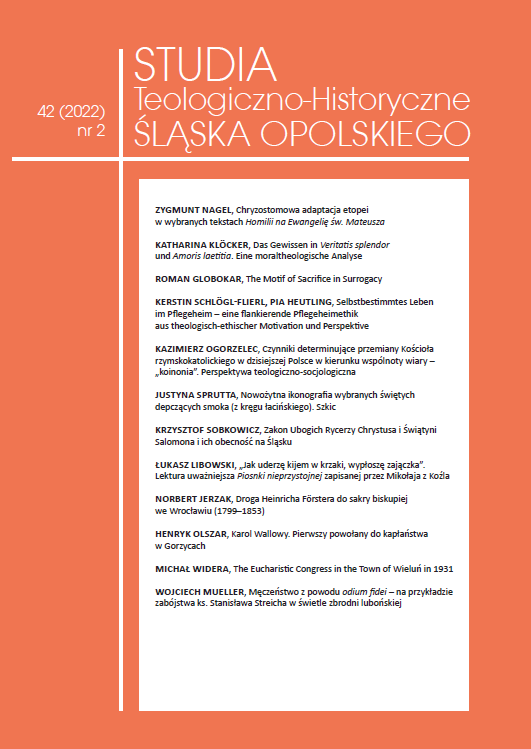The Motif of Sacrifice in Surrogacy
The Motif of Sacrifice in Surrogacy
Author(s): Roman GlobokarSubject(s): Gender Studies, Social psychology and group interaction, Family and social welfare
Published by: Uniwersytet Opolski
Keywords: surrogacy; altruism; sacrifice; human dignity; instrumentalization;
Summary/Abstract: The regulation of surrogacy varies between different countries. There is a trend towards greater liberalization on the global level. Ethical evaluation creates a basic dilemma: Is surrogacy a superior form of solidarity between people or the instrumentalization of a woman’s body, being contrary to the fundamental dignity of every human person? How does surrogacy affect people involved in the process and what do decades of experi- ence with surrogacy tell us about its effect on human beings? Is there an ideal form of sur- rogacy where reproductive parties themselves describe the relationship as satisfactory, fair, and just, and where the well-being of all involved parties is equally considered?In this article, we will look at the unsuccessful initiative to regulate at least the issue of al- truistic surrogacy in the Council of Europe countries in 2016. The aspect of sacrifice of the surrogate mother for the well-being of the couple who wants a child is often raised. However, the mere altruistic intention to help another does not make an act ethically acceptable. The paper also draws attention to several ethical reservations regarding surrogacy. The most con- troversial issue is the instrumentalization of a woman’s body. Especially in poor countries, the victims of surrogacy are very badly informed about the procedure, while their freedom and autonomy are significantly infringed. A child born to a surrogate mother can also be a victim of various interests of intended parents, different corporations and the woman who gave birth to him/her. The paper outlines the vulnerability of the intended parents, the surro- gate mother, and above all the child, who is often forgotten in the debates. Additionally, it also touches upon the frequently neglected ethical perspective of personal desire, sacrifice, and victimization. When is it ethically acceptable, from the point of the altruistic action recipient, to expect and accept altruistic actions? When do subjective expectations and desires cross the boundary that divides means of overcoming health limitations from mere selfishness? Last but not least, it also questions when the intent of helping others transforms from an ethically acceptable sacrifice to ethically unacceptable victimization.
Journal: Studia Teologiczno-Historyczne Śląska Opolskiego
- Issue Year: 42/2022
- Issue No: 2
- Page Range: 51-72
- Page Count: 22
- Language: English

